Science for Development Award
Sponsored by the Department of Foreign Affairs and Self Help Africa
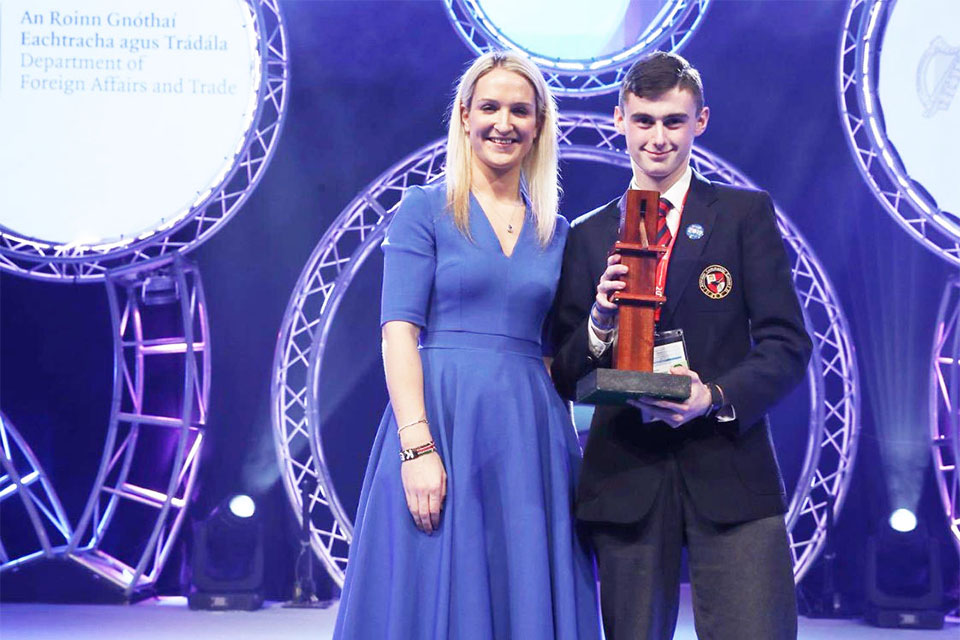
BT Young Scientist & Technology Exhibition
The annual BT Young Scientist & Technology Exhibition is attended by over 60,000 people each year. The exhibition gives students from all over Ireland, aged between 11 and 18 years, a platform to showcase their ideas and talents in the science and technology arena where they compete for the title 'BT Young Scientist of the Year'. As part of the BT Young Scientists and Technology Exhibition there is a special category called the Science for Development Award.
The Science for Development Award
The Science for Development Award was established in 2006 and is organised by Self Help Africa. The award was established to encourage teachers and students to develop ideas, using appropriate scientific technology that may address challenges and prove useful at local community level in the Global South, to reduce poverty and promote social justice. The aim is to give students a greater insight into the wider world, and their role as global citizens. The winners of the award receive a perpetual trophy and a €5,000 bursary, sponsored by DFAT, for one student and one teacher to travel on a fact-finding/field testing visit to a country in Africa, in association with Self Help Africa.
The Science for Development Award is open to any entrant who has been accepted in the Intermediate or Senior sections of the BT Young Scientist and Technology Exhibition and whose project addresses issues faced by people in the Global South. The BT judging panel will select finalists for the award and their criteria is as follows:
Criteria - The winning project of the Science for Development Award should:
1. Show a clear understanding of the causes of poverty, injustice and inequality in a Global South context and a willingness to learn more. Issues might include: Food and livelihood security; climate change and the environment (e.g. deforestation, clean water and sanitation, fertile soil, soil erosion, fishery, energy, air quality, pollution); gender equality; appropriate technology; access to education; health issues e.g. HIV/AIDS, TB, maternal/child health.
2. Use appropriate and sustainable technology, solutions and/or materials that can be adopted and implemented at local community level in the Global South.
3. Demonstrate a clear understanding of the local context, target audience and needs, which the project is designed for.
4. Demonstrate an understanding of the connections between the local (Ireland) and the global level in relation to the chosen development issue and project, as well as an understanding of a partnership approach to development.
Category: All
Age Group: Intermediate & Senior
- https://selfhelpafrica.org/ie/education/ is the link to the Development Education page on the SHA website. Scroll down for the relevant section on the BTYSTE award. A list of the winners and brief information back to the inaugural winners in 2006.
- https://www.youtube.com/watch?v=gY2m3qrZE8s link to video produced in 2016 for promotion of the award in schools.
2019 Winner of the Science for Development Award
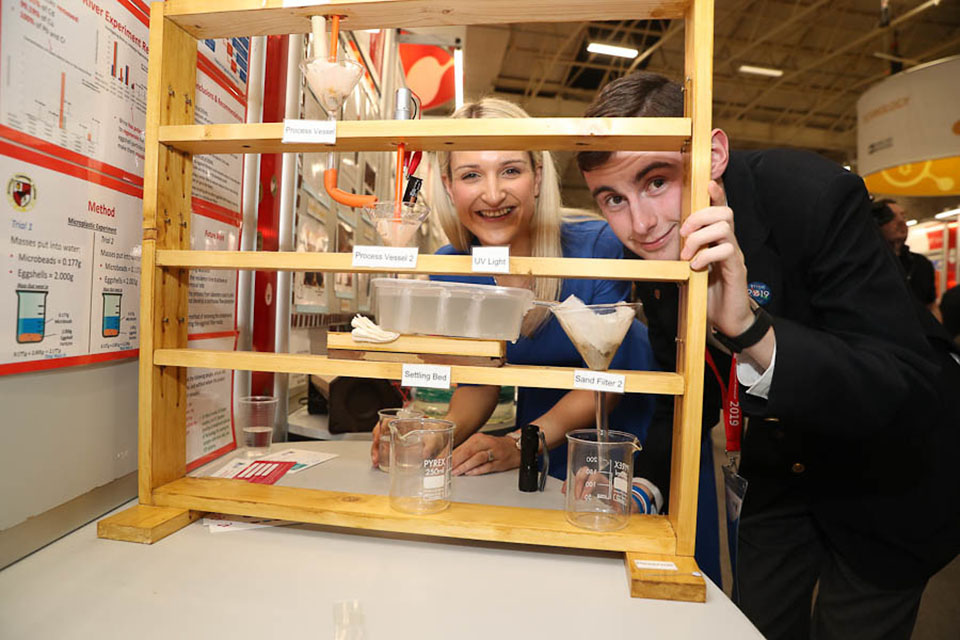
The 2019 Science for Development Award winner at BT Young Scientist and Technology Exhibition is Seán Byrne from Avondale Community College in County Wicklow. Seán's project explores the use of a low cost eggshell filtration system to remove heavy metal pollutants from water. The system has the added benefit of removing microplastics from the water at the same time. Seán and his teacher will travel to Africa with Self Help Africa in early 2020 to field test the invention.
Read more about the Science for Development Award 2019 at BTYSTE. Read about the Science for Development Showcase Event 2019.
2018 Winner of the Science for Development Award
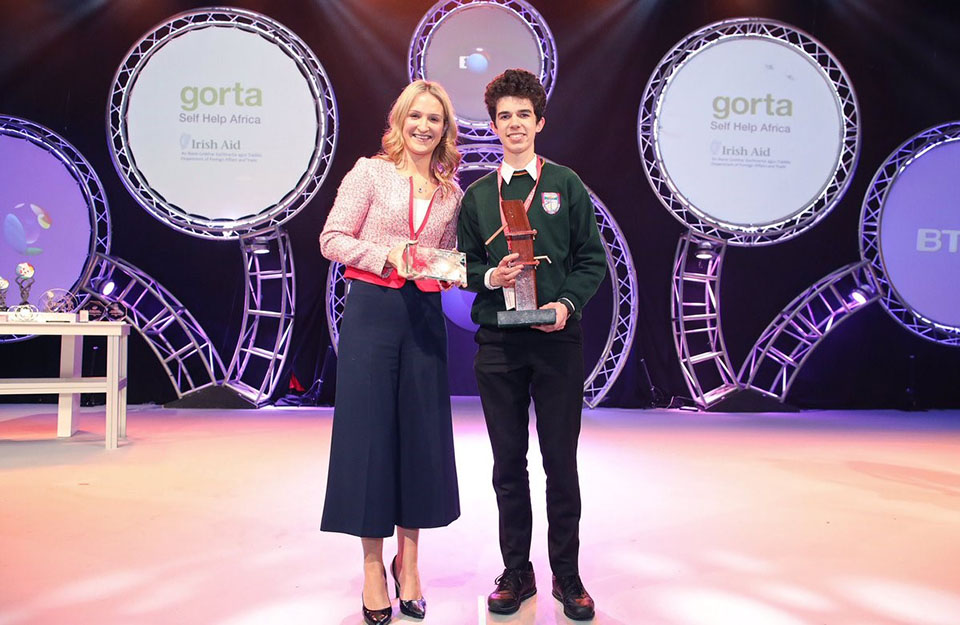
The winner of the DFAT sponsored Science for Development Award at the BT Young Scientist and Technology Exhibition 2018 was Timothy McGrath, a sixth year student from Killorglin Community College.
Timothy's award winning project was an investigation into the use of CRISPR-Cas9 to genomically edit paramecium caudatum to purify vibrio cholera infected water in developing countries. Using genetic engineering, Timothy changed the DNA of a micro-organism that can be added to water. The organism feeds on the bacteria that causes cholera and purifies the water.
In developing his project, Timothy combined his interest in microbiology with a desire to address challenges faced by some of the world's poorest communities. He was inspired by his late uncle, Fr Tim O'Riordan who was a parish priest in Waterford, and collected funds in his local parish to support the development of irrigation and water systems for a community in a small town in Kenya.
In February 2019, Timothy travelled to Uganda on a trip organised by the Development Education unit of Self Help Africa. In Uganda, Timothy presented his cholera project to students and staff at Busitema University in Soroti, East Uganda where he showed university students how they could develop the technology quite cheaply. He also presented a second project, a biofilter system using halophyte plants to combat oceanic dead zones. This project won him 3rd place in the Senior Individual Biological and Ecological Sciences category at BTYSTE 2019.
While in Uganda, Timothy visited farmers' groups in areas where Self Help Africa is implementing a DFAT funded project to improve livelihoods, nutrition and climate resilience of smallholder farmers. The farmers demonstrated how they have begun to diversify the range of crops that they grow in order to adapt to climate change.
The group later visited a refugee camp in Kiryandongo, Western Uganda. They were shown how locally grown maize is distributed there, strengthening the capacity of local farmers rather than importing foodstuffs.
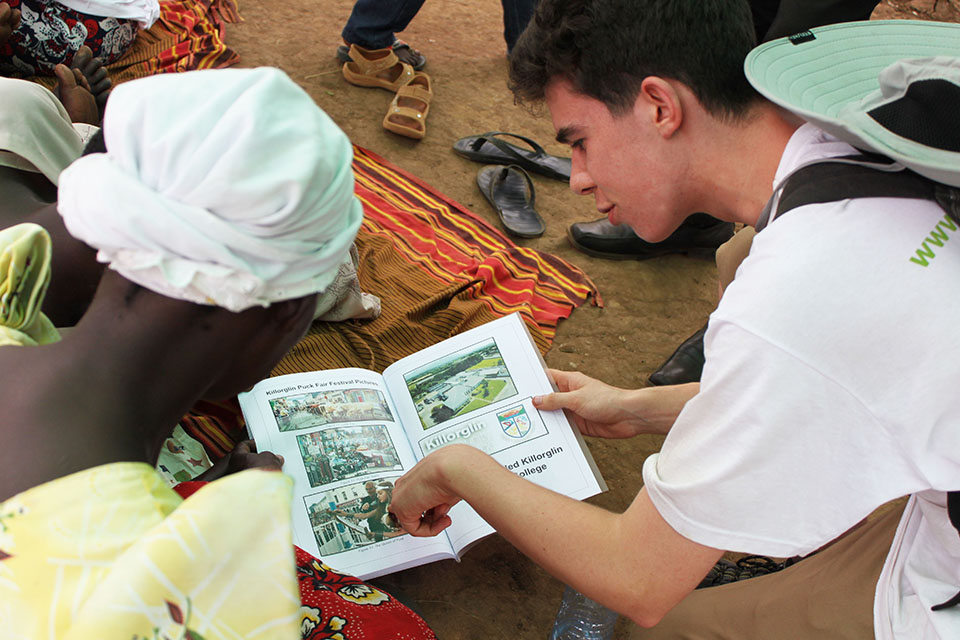
Read about the Science for Development Showcase Event 2018 in Iveagh House.
2017 Winners of the Science for Development Award
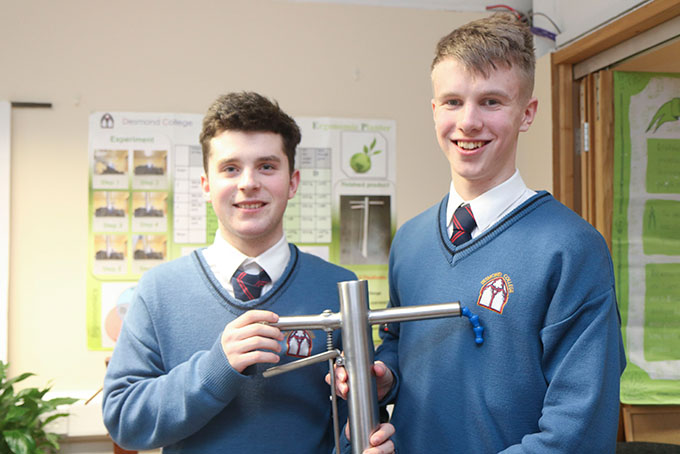
The winners of the DFAT sponsored Science for Development Award at the BT Young Scientist and Technology Exhibition 2017 were Jack O'Connor and Diarmuid Curtin from Desmond College, Newcastle West, Co. Limerick. Their technology project, an Ergonomic Planter for use in developing countries, aimed to minimise seed/ plant wastage, improve production by ensuring consistency of planting, increase land usage by guiding farmers in their planting all whilst reducing back strain and increasing speed of planting.
As part of their prize, Diarmuid, Jack and their teacher Donal Enright travelled to Malawi on the annual schools' trip organised by the Development Education unit of Self Help Africa. While there, the boys learned from farmers that the metal used in the planter wouldn't be locally available or affordable, and that a planting device made from bamboo or plastic would be cheaper and easier for them to maintain. Diarmuid and Jack also presented their project to students at Lilongwe University of Agriculture and Natural Resources, one of Malawi's leading agriculture science colleges.
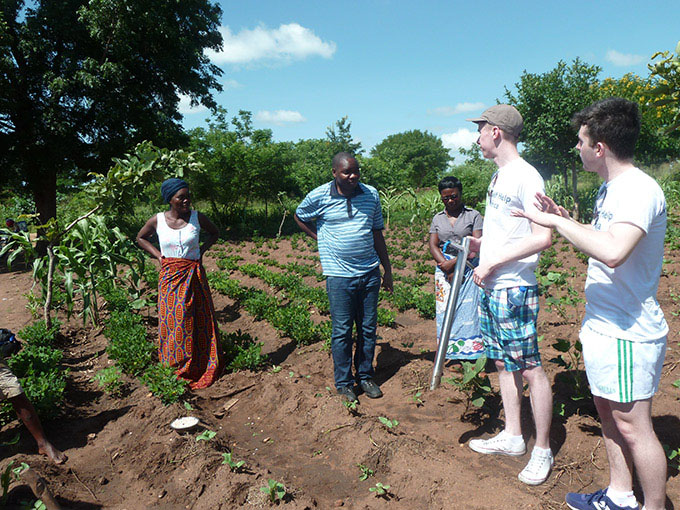
Proving that the Science for Development Award can have an impact long after school, Jack O'Connor, now a University of Limerick student, launched the seed planter as an Enactus project which was selected to represent Ireland at the Enactus World Cup in Silicon Valley in 2019. Now rebranded as Moyo Nua, the new prototype has been designed from bamboo, taking the advice of the Malawian farmers on board. In April 2019 the project won the inaugural "Peace Through Trade" competition hosted by The World Trade Centers Association Foundation (WTCAF) in Querétaro, Mexico where Jack presented his vision to 500 representatives from Member World Trade Centres from 91 countries and their local companies.
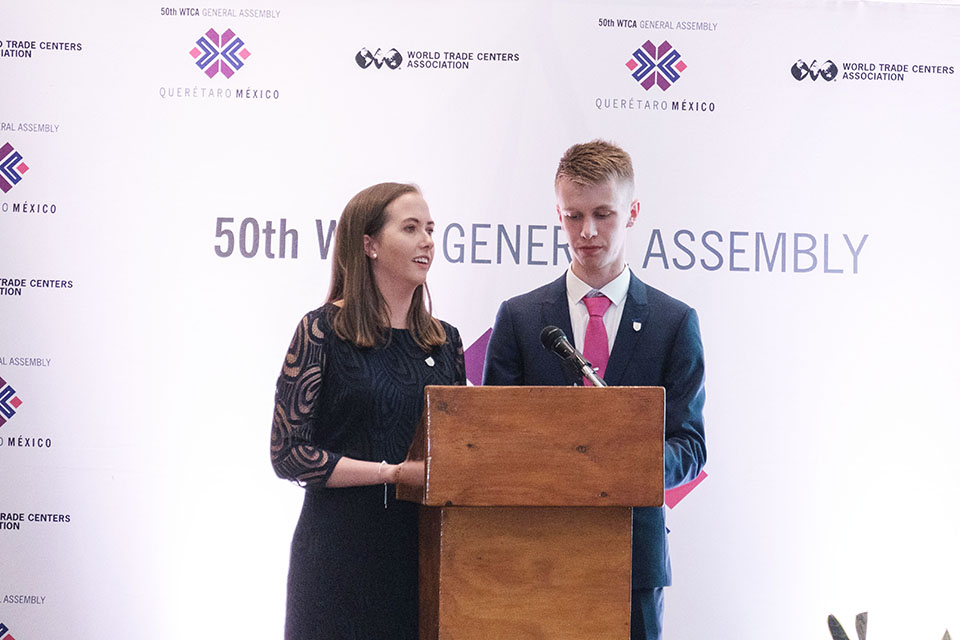
For information on the Science for Development Award visit Self Help Africa or the BT Young Scientist and Technology Exhibition website.

